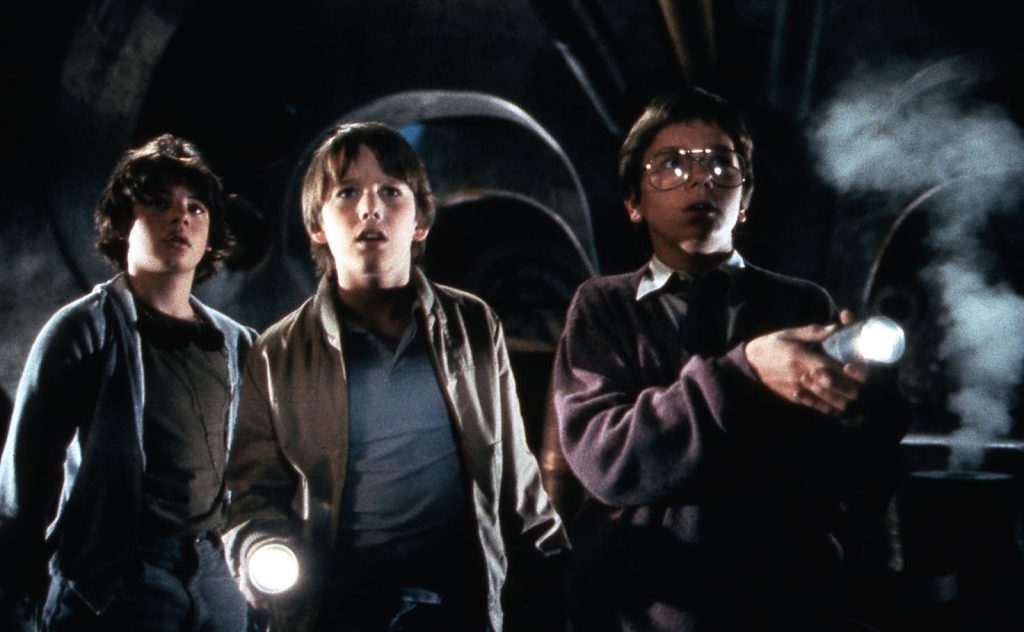Ben Crandall is the dreamer. Not only does he daydream about going to space, at night he dreams of a device that will allow him to do just that. His friend and fellow misfit, Wolfgang Müller, is the scientist, capable of translating Ben’s crude drawings into a circuit board that can power their means of getting there. And Darren Woods is the realist, a late addition to their club who literally lives on the wrong side of the tracks and knows where to acquire the materials they need to construct their craft, which he dubs the Thunder Road. Take any one of them out of the equation and none get to go, but because they’re allied at the exact right moment, they have an adventure they’ll never forget.
Along with the boys, director Joe Dante’s career was on the ascent in the ’80s. He started the decade with one of its best werewolf movies (1981’s The Howling) and went on to helm two episodes of Police Squad! and the second-best segment of 1983’s Twilight Zone: The Movie (the gonzo update of “It’s a Good Life”). The latter impressed producer Steven Spielberg, who put him to work on a little monster movie called Gremlins, which was such a monster hit, it put him in a position to direct his most personal project to date: Explorers, one of a number of kid-centered fantasies greenlit to capitalize on the success of E.T. (Some others include The NeverEnding Story, D.A.R.Y.L., SpaceCamp, Flight of the Navigator, and The Boy Who Could Fly. Spielberg himself got in on the act with The Goonies, which came out one month before Explorers.)
Setting up shop at Paramount, Dante jumped straight into what he deemed a “simpler movie” than Gremlins “because it was just these kids who build a spaceship.” However, a regime change at the studio (almost invariably bad news) and an accelerated production to make a summer release date meant the film that arrived in theaters on July 12, 1985, was unfinished – at least to Dante’s eyes. “This was a very ambitious movie that we were finding in the editing room. I mean, there were a lot of aspects of the picture that just never made it into the movie because we literally froze where we were.” While Dante did some tinkering for the home video release, though, both versions are fundamentally the same. (Quotes from Joe Dante, published by FilmmuseumSynema Publications in 2013, the first and still the only critical volume on Dante’s work in English.)

Dante’s “simpler movie” is detectable in the first hour of Explorers, as the boys – played by Ethan Hawke (in his screen debut), River Phoenix, and Jason Presson – figure out how to realize their common goal. This is also where Dante and screenwriter Eric Luke fill viewers in on their home lives. Ben’s is the most stable, with a loving mother (whose most pressing concern is his diet of ’50s science fiction) and unseen father and brother. Wolfgang’s is pure chaos, with two eccentric parents who gifted him with a name that put a target on his back at school and a gaggle of siblings who run riot everywhere but the basement, his fiercely protected domain. Darren’s is one of hardship, with a dead mother, an unemployed, alcoholic father (briefly heard, never seen), and the father’s girlfriend (same), providing him with the most tangible reasons to escape. Darren’s chance meeting with Ben, intervening with the school bully, not only gains him friends, but a purpose, and crucially, hope for the future. (It’s a telling moment when he reveals he doesn’t dream. Dreaming is a luxury he can’t afford.)
If Explorers seems like a different movie when it gets to space, that’s essentially because it is. The spaceship sequence is even credited to a different editor than the rest of the film, which was cut by Tina Hirsch (who met Dante in the editing suite at New World). This sequence, the most Dante-esque in the film, is also where Rob Bottin’s makeup effects come to the fore, continuing an association that went back to Piranha. Also on board and doing stellar work are cinematographer John Hora, whose shooting style for the spaceship interiors is in stark contrast with the naturalistic Earth scenes, and composer Jerry Goldsmith, whose contributions were an integral part of Dante’s films from Twilight Zone on. Goldsmith’s experiments with synthesizers (also heard in Gremlins) reached their peak here.
No appreciation of Explorers would be complete without mention of the most oft-used members of Dante’s repertory company: Dick Miller and Robert Picardo. Miller plays a helicopter pilot who witnesses the Thunder Road’s maiden flight and seems poised to ground the boys, but he gives his character more shading than that, along with a wistful admiration for their achievement. Meanwhile, Picardo pulls triple duty as the lead in Starkiller, the hilariously badly dubbed space opera they check out at the drive-in, and two of the aliens they meet at the end of their journey (who have clearly been watching the same movies as Ben). As the story’s open ending shows, though, the adventure that brought Ben, Wolfgang, and Darren together was likely the first of many, even if the follow-ups never made it to movie screens.
“Explorers” is streaming on Kanopy and Hoopla. It is also available in both its theatrical cut and home video version from Shout Select.

